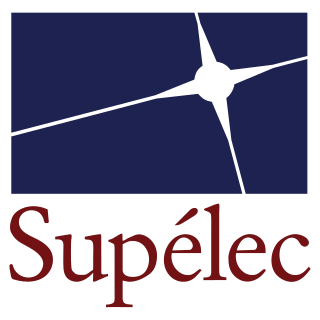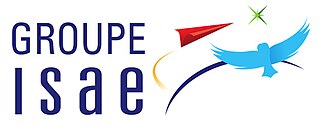
The University of Toulouse is a community of universities and establishments (ComUE) based in Toulouse, France. Originally it was established in 1229, making it one of the earliest universities to emerge in Europe. Suppressed during the French Revolution in 1793, it was refounded in 1896 as part of the reorganization of higher education. It was finally abolished in 1969, giving birth to the three current universities: Toulouse 1 Capitole University, University of Toulouse-Jean Jaurès and Toulouse III - Paul Sabatier University. The ComUE in the Toulouse region was known as Federal University of Toulouse Midi-Pyrénées. On January 1, 2023, the university was renamed as the University of Toulouse.

École nationale de l'aviation civile (ENAC) is one of 205 colleges accredited to award engineering degrees in France. ENAC is designated as a grande école by the Conférence des Grandes écoles (CGE), a non-profit organisation which certifies and monitors grandes écoles. ENAC was founded on 28 August 1949 to provide initial and continuing education in the field of civil aviation. The school is an établissement public à caractère scientifique, culturel et professionnel, and operates under the oversight of the Ministry of Ecological Transition. Affiliated with the University of Toulouse and Aerospace Valley, it is one of the five founders of France AEROTECH.

The Federal University of Itajubá, is a federal university located in the state of Minas Gerais, Brazil. It is considered the first technological university and one of top ten engineering schools in Brazil. Extremely reputable among Brazilian engineering schools, it carries more than 100 years of tradition in teaching, with emphasis on Electrical Engineering – which is one of the best research institutes on Power Systems field in Latin America – Mechanical Engineering, Environmental Engineering, Materials Engineering, Automation and Control engineering and Computer Engineering.

The Institut Supérieur de l'Aéronautique et de l'Espace is a French grande école of engineering, founded in 1909. It is the world's first dedicated institute of aerospace engineering. ISAE-SUPAERO is part of University of Toulouse, ISSAT, PEGASUS, GEA, Toulouse Tech, CESAER and Aerospace Valley. The institute is ranked highly among Europe's engineering schools.

The École Nationale Supérieure de Mécanique et d'Aérotechnique (ISAE-ENSMA) is a grande école founded in 1948 and located near Poitiers, France.

Institut supérieur d’électronique de Paris (ISEP) is a French grande école located in Paris. It specializes in electronics, telecommunication and computer science.

University of Versailles Saint-Quentin-en-Yvelines is a French public university created in 1991, located in the department of Yvelines and, since 2002, in Hauts-de-Seine. It is a constituent university of the federal Paris-Saclay University.
French university associations known as "pôles de recherche et d'enseignement supérieur" were a form of higher-level organization for universities and other institutions established by French law in effect from 2007 to 2013. The 2013 Law on Higher Education and Research (France) discontinued the PRES; these have been largely replaced by the new Communities of Universities and Institutions. The list below indicates the status of those institutions designated as PRES or related associations before the 2013 law took effect. See the list of public universities in France for the current status of these institutions.

Institut Mines-Télécom (IMT) is a French public academic institution dedicated to Higher Education and Research for Innovation in the fields of engineering and digital technology, organized as a Collegiate University. Created in 1996, it was originally known as the "Groupe des écoles des télécommunications", or GET, followed by the "Institut Télécom". The Mines schools, which were placed under the administrative supervision of the Ministry of Industry, joined the Institut in March 2012 when it took on its current name and gained the status of Grand établissement. It combines high academic and scientific legitimacy with a practical proximity to business and a unique positioning in 3 major transformations of the 21st century: Digital Affairs, Energy and Ecology, and Industry. Its training and research for innovation are rolled out in the Mines and Télécom Graduate Schools. The Institut falls under the administrative aegis of the General Council for the Economy, Industry, Energy and Technologies.

École supérieure d'électricité, commonly known as Supélec, was a French graduate school of engineering. It was one of the most prestigious grande écoles in France in the field of electrical engineering, energy and information sciences. In 2015, Supélec merged with École Centrale Paris and became CentraleSupélec, a constituent member of Université Paris-Saclay.
The Autorité de Régulation des Communications Électroniques, des Postes et de la Distribution de la Presse is the French regulatory authority in charge of regulating telecommunications, postal services and print media distribution in France. It can be compared somewhat with the United States' Federal Communications Commission (FCC), though regulation of the radio spectrum falls to the Agence nationale des fréquences, and regulation of audiovisual and digital communication falls to the Autorité de régulation de la communication audiovisuelle et numérique since the merger on 1 January 2022 of the former Conseil supérieur de l'audiovisuel and the former Haute Autorité pour la diffusion des œuvres et la protection des droits sur internet. The ARCEP has its head office in 14 rue Gerty Archimède in Bercy, Paris, France.

The Institut Polytechnique des Sciences Avancées (IPSA), is a French private grande école in aerospace engineering located at Ivry-sur-Seine, Lyon and Toulouse, recognized by the French state since 2010, whose diploma has been accredited by the French Commission des Titres d'Ingénieur since 2011. It was founded in 1961 and has been part of IONIS Education Group since 1998.

The Partnership of a European Group of Aeronautics and Space UniversitieS (PEGASUS) is a network of aeronautical universities in Europe created in order to facilitate student exchanges and collaborative research between universities. It has been originally created by the groupement des écoles aéronautiques françaises in 1998.

The Institut au service du spatial, de ses applications et technologies (ISSAT), is a French association supported by French Ministry of Education, created in 1995 in order to develop the aerospace activities in Toulouse and to help developing the knowledge of aerospace in France and Europe
Toulouse Tech, also called the Toulouse Institute of Technology, is one of the grandes écoles network in France. Created in 2007, it gathers 16 French grandes écoles, covering engineering science, management, architecture and veterinary, aiming to be of comparable status to the most famous universities of technology around the world.
An établissement public à caractère administratif is, in France, a public law legal person with a certain administrative and financial autonomy to fulfil a mission of public interest under the control of the State or a local authority.

CentraleSupélec (CS) is one of the most prestigious and selective grandes écoles in France and is a member of the graduate engineering school of Paris-Saclay University in Gif-sur-Yvette, France. It was established on 1 January 2015, as a result of a strategic merger between two prestigious grandes écoles in France, École Centrale Paris and Supélec. CentraleSupélec is also considered to be among the best engineering schools of France and most elite institutions in Europe, with an admission rate of 6 to 8% in 2019. It is one of the constituent members of Paris-Saclay University.

Rangueil is a residential area south-east of Toulouse in Haute-Garonne, France, where grandes écoles and Universities are located as well as an important scientific complex. It has 2,295 inhabitants (2018).

Groupe ISAE is a network of aeronautical engineering Colleges in France.














